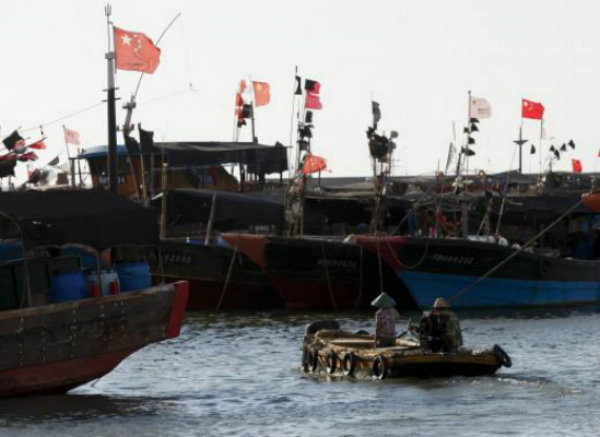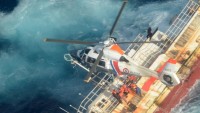Google Teams Up with Environmental Groups to Track Global Fishing Activities
| Vittorio Hernandez | | Nov 15, 2014 04:33 AM EST |
(Photo : Reuters / John Ruwitch) A dinghy ferries people to fishing boats at a port in the city of Dongfang on the western side of China's palm-fringed island province of Hainan, June 18, 2014.
Information technology giant Google and green groups Skytruth and Oceana unveiled on Friday the Global Fishing Watch to monitor overfishing activities around the world. To perform that daunting task, the project would combine cloud computing, big data and large networks.
The target of the watch is to "give citizens a simple, online platform to visualize, track and share information about fishing activity worldwide," a statement from Oceana said.
Like Us on Facebook
According to a 2014 U.N. Food and Agriculture Organization report, more than 90 percent of the world's fishing areas are overfished.
The first global view of commercial fishing would be based on analysis of satellite data. Google showed how the platform works through a mapping workshop held on Friday at the 2014 International Union for Conservation of Nature World Parks Congress in Sydney, Australia, reports Computerworld.
It analyzed Automatic Identification System traffic signals, automatically send via VHF transmitters on vessels. Among the data send using that method are the ship's name, speed and direction. The same information is available on websites such as Shipfinder.co.
Non-fishing vessels are excluded from the feeds and would not be plotted on the map. There is a demonstration video posted on YouTube on how to map vessels from the same country by using the same color. The video said that areas such as Kiribati's Phoenix Islands Protected Area, classified as sensitive or protected zones, could also be monitored for illegal fishing activity.
The watch has sufficient data from 2012 to 2013 to identify the overfished areas, allowing it to focus on creating a public-facing service showing fishing "in near real-time" and providing lead for authorities where overfishing activities happen.
It blamed overfishing for the destruction of the ocean ecosystem and pointed to species such as the Bluefin tuna as the target of illegal fishers and the concern of conservationists.
Although a lot of activities on the open seas are often "invisible," which prevents understanding better the problem and sharing the information globally, "Satellite data is allowing us to make human interaction with the ocean more transparent than even before," Skytruth President John Amos said in a statement.
©2015 Chinatopix All rights reserved. Do not reproduce without permission
EDITOR'S PICKS
-

Did the Trump administration just announce plans for a trade war with ‘hostile’ China and Russia?
-

US Senate passes Taiwan travel bill slammed by China
-

As Yan Sihong’s family grieves, here are other Chinese students who went missing abroad. Some have never been found
-

Beijing blasts Western critics who ‘smear China’ with the term sharp power
-

China Envoy Seeks to Defuse Tensions With U.S. as a Trade War Brews
-

Singapore's Deputy PM Provides Bitcoin Vote of Confidence Amid China's Blanket Bans
-

China warns investors over risks in overseas virtual currency trading
-

Chinese government most trustworthy: survey
-

Kashima Antlers On Course For Back-To-Back Titles
MOST POPULAR
LATEST NEWS
Zhou Yongkang: China's Former Security Chief Sentenced to Life in Prison

China's former Chief of the Ministry of Public Security, Zhou Yongkang, has been given a life sentence after he was found guilty of abusing his office, bribery and deliberately ... Full Article
TRENDING STORY

China Pork Prices Expected to Stabilize As The Supplies Recover

Elephone P9000 Smartphone is now on Sale on Amazon India

There's a Big Chance Cliffhangers Won't Still Be Resolved When Grey's Anatomy Season 13 Returns

Supreme Court Ruled on Samsung vs Apple Dispute for Patent Infringement

Microsoft Surface Pro 5 Rumors and Release Date: What is the Latest?













